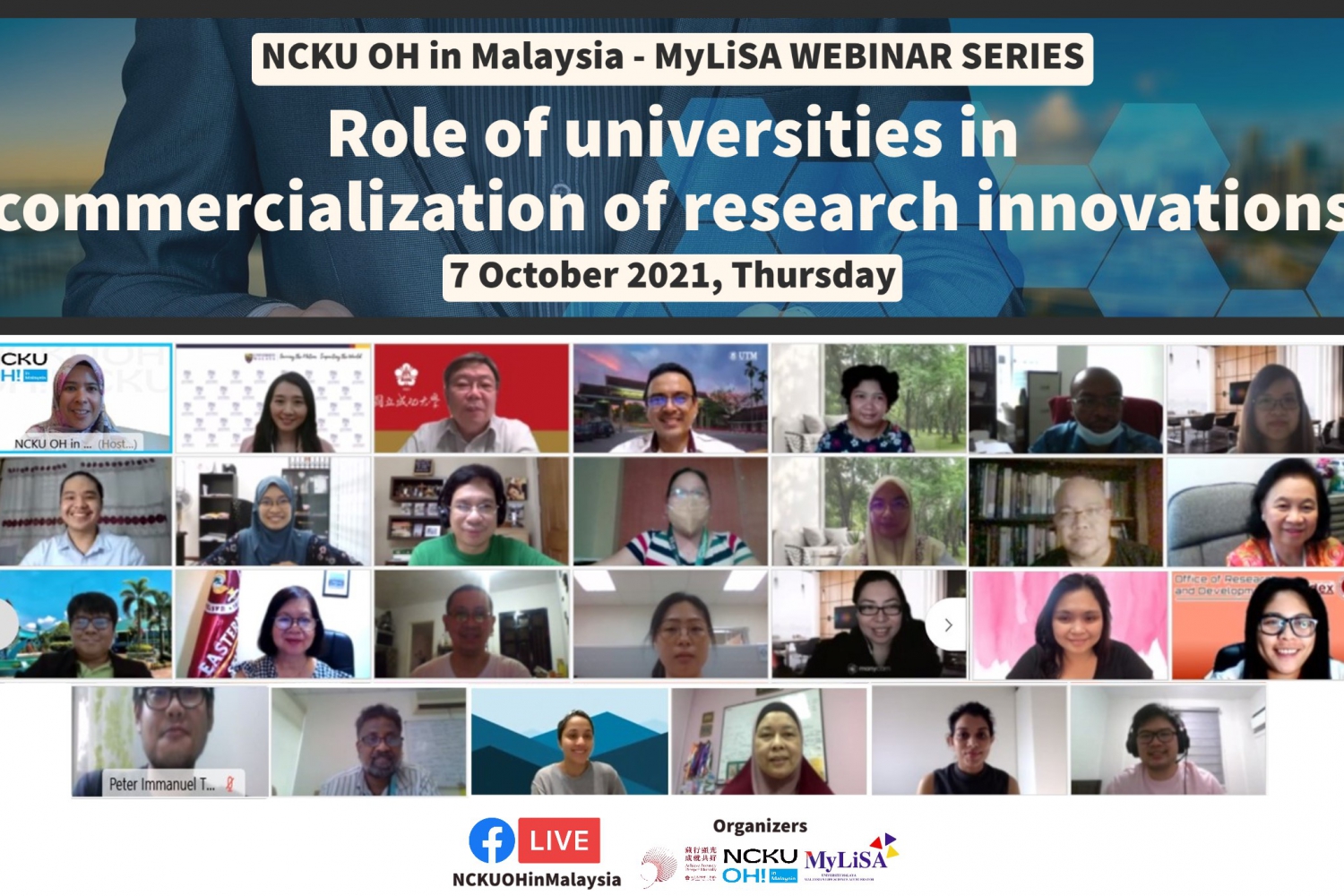Malaysia Business
[Webinar Series] Role of Universities in Commercialization of Research Innovations
2021-10-07

The National Cheng Kung University (NCKU) Overseas Hub in Malaysia in collaboration with the Malaysian Life Science Accelerator (MyLiSA), UM Centre of Innovation & Commercialization (UMCIC), Malaysia have organized a webinar entitled “Role of universities in commercialization of research innovations” to discuss on how universities are supporting research innovation commercialization as a part of its educational mission, and what are the critical challenges that are hindering the progression of research and development to commercialization and entrepreneurship. This webinar was specifically designed to provide academicians and researchers who are interested in translating research into practical applications on the role of universities in facilitating commercialization efforts.
In this first episode of the NCKU OH in Malaysia – MyLiSA webinar series, three distinguished panelists were invited - Prof. Chih-Han Chang, Assoc. Prof. Dr. Ramesh K S @ Mohd Zaidi Abd Rozan and Miss Atiqah Zaki. Dr. Kwong Soke Chee, MyLiSA’s project manager acted as the discussion’s moderator and started the session by emphasizing that the role of universities is not just limited to teaching and conducting research, but universities nowadays are required to actively take up another role which is to accelerate and to commercialize research and innovations. This means that universities are required to improve their capacity in translating their research results from the laboratory into newly or improved products and services, and introducing it into the market place. There is no doubt that academicians and researchers must acquire both scientific and business skills to successfully master the journey of knowledge commercialization for universities.
Our first panelist was Miss Atikah Zaki, a co-founder of Skinlync, a UK health tech start up supported by Accelerate Cambridge which is the University of Cambridge’s Accelerator program. She started her presentation by sharing her personal views as an entrepreneur, “Being an entrepreneur, it is very exciting, it is an enriching experience, but beyond that, it is also very challenging, but I think the most important part is that if you have an idea, and you think it is something innovative, something that can be scaled and it can really create an impact on people, then you should actually pursue those things, at least give it a try, so that you know whether that thing will work or not”. She then directed the audience to her start up journey and highlighted on the support that she received from her university. She shared that the Accelerate Cambridge provides a series of classes and mentor meetings to its’ team of entrepreneurs. Each team is paired with different type of mentors whom are either business experts, academicians or fellow entrepreneurs. Apart from mentorship, other type of supports provided by the university includes grant funding, regional business support, visa support and Oxbridge Angels or Cambridge Venture Capitals.
The second panelist was Assoc. Prof. Dr. Ramesh K S @ Mohd Zaidi Abd Rozan which is the Former Director of UTM Center for Student Innovation & Technology Entrepreneurship (UTMXCITE), Universiti Teknologi Malaysia (UTM), Malaysia. He shared on the operational, internal and external support that they receive for the UTM’s Student Entrepreneurship Development ecosystem. He also shared the details of the UTM XCITE Student Entrepreneurship Development model. In this model, they focused on three aspects; 1) Stimulate: To support students with a business idea, 2) Educate: To create awareness for entrepreneurship as a career option, and 3) Incubate: To support the launch of an actual company. In addition, he highlighted on how does his university contributes to the innovation development, in which by creating the Student Entrepreneurship Policy and the Unique Commercialization Policy and Entrepreneurship 2+1 year leave for university staffs.
The final panelist for the event was Prof. Chih-Han Chang, the Director of Medical Device Innovation Center, National Cheng Kung University (NCKU), Taiwan. Prof. Chang has focused his 15-minutes presentation on the research translation in the initial stage. He first emphasized that research is not translation, and further shared on the three important factors for both research and translation which are identification of unmet needs, providing affordable technology solution, and a sufficient and a stable capital. He added, however, for translation, there are additional factors that are required such as Intellectual Property (IP) and regulation, market and exit strategy, and talent diverse professionals. In his sharing session, he also elaborated on the challenges associated with research translation.
To view the full webinar, the recorded session is available at https://fb.watch/8DNdcuk1Gc/. The 1-hour webinar was attended by 48 participants from different parts of the globe (Malaysia, Taiwan, Vietnam, Philippines, Indonesia and Thailand). Among the participating universities were Universiti Malaya and Universiti Kebangsaan Malaysia (Malaysia), De La Salle University (Philippines), Universitas Padjadjaran (Indonesia) and Mahidol University (Thailand). The next NCKU OH in Malaysia – MyLiSA webinar series will be on the topic of “Bringing a medical device to the market: regulatory and commercializing challenges”. In this topic, invited panelists will discuss on the strategies to navigate regulatory challenges and effective commercialization for academicians and researchers.
Keyword: